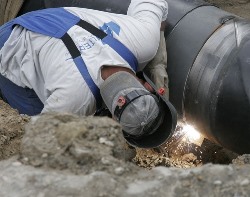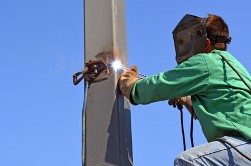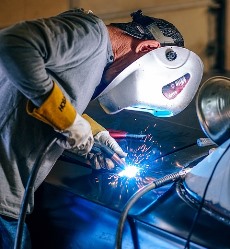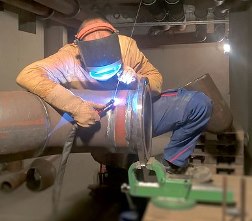How to Choose a Welding Certification Program near Princeton Idaho
 Enrolling in the ideal welding vocational school near Princeton ID is an important first step to starting your new occupation as a professional welder. But since there are numerous schools to pick from, how do you determine which ones to consider? And more significantly, once you have narrowed down your alternatives, how do you select the right one? Many people begin by checking out the schools that are nearest to their homes. When they have located those that are within commuting distance, they gravitate toward the least expensive one. Yes, location and tuition cost are important considerations when examining welder technical schools, but they are not the only ones. Other concerns include such things as accreditation, reputation and job placement rates. So before initiating your search for a vocational school to become a welder, it’s prudent to establish a list of qualifications that your selected school must have. But before we examine our due diligence checklist, let’s talk a little bit about how to become a welder.
Enrolling in the ideal welding vocational school near Princeton ID is an important first step to starting your new occupation as a professional welder. But since there are numerous schools to pick from, how do you determine which ones to consider? And more significantly, once you have narrowed down your alternatives, how do you select the right one? Many people begin by checking out the schools that are nearest to their homes. When they have located those that are within commuting distance, they gravitate toward the least expensive one. Yes, location and tuition cost are important considerations when examining welder technical schools, but they are not the only ones. Other concerns include such things as accreditation, reputation and job placement rates. So before initiating your search for a vocational school to become a welder, it’s prudent to establish a list of qualifications that your selected school must have. But before we examine our due diligence checklist, let’s talk a little bit about how to become a welder.
Welding Certificate and Degree Training Classes
 There are several options available to receive training as a welder in a technical or trade school. You can receive a diploma, a certificate or an Associate Degree. Bachelor Degrees are offered in Welding Technology or Welding Engineering, but are more advanced degrees than most journeyman welders will need. Some programs are also offered in conjunction with an apprenticeship program. Below are brief descriptions of the most typical welding programs offered in the Princeton ID.
There are several options available to receive training as a welder in a technical or trade school. You can receive a diploma, a certificate or an Associate Degree. Bachelor Degrees are offered in Welding Technology or Welding Engineering, but are more advanced degrees than most journeyman welders will need. Some programs are also offered in conjunction with an apprenticeship program. Below are brief descriptions of the most typical welding programs offered in the Princeton ID.
- Certificate and Diploma Programs are generally made available by technical and trade schools and require about one year to finish. They are more hands-on training in nature, fashioned primarily to develop welding skills. They can furnish a good foundation for a new journeyman or apprentice welder, or specialized skills for experienced welders.
- Associate Degree Programs will take 2 years to complete and are usually offered by community colleges. An Associate Degree in Welding Technology offers a more extensive education than the diploma or certificate while still providing the foundation that prepares students to enter the workforce.
A number of states and municipalities do have licensing prerequisites for welders, therefore don’t forget to check for your location of potential employment. As needed, the welding school you select should ready you for any licensing exams that you will need to take in addition to supplying the proper training to become a professional welder.
Welder Certification Options
 There are several institutions that offer welder certifications, which evaluate the knowledge and skill level of those applying. Numerous Princeton ID employers not only demand a certificate or degree from an accredited welding school, but also certification from a renowned organization like the American Welding Society (AWS). A variety of certifications are offered dependent on the kind of work that the welder performs. Some of the things that certification can attest to are the welder’s ability to
There are several institutions that offer welder certifications, which evaluate the knowledge and skill level of those applying. Numerous Princeton ID employers not only demand a certificate or degree from an accredited welding school, but also certification from a renowned organization like the American Welding Society (AWS). A variety of certifications are offered dependent on the kind of work that the welder performs. Some of the things that certification can attest to are the welder’s ability to
- Work in compliance with specific codes
- Work with certain metal thicknesses
- Work with various kinds of welds
- Perform based on contract specifications
As already stated, many states, cities or local municipalities have licensing mandates for welders. Of those mandating licensing, many additionally require certification for various types of work. Certification is also a means to prove to employers that you are an exceptionally skilled and knowledgeable welder. So just as with licensing, look into the requirements for your location and verify that the welder vocational school you choose preps you for certification if needed.
How to Pick a Welding Tech School
 As soon as you have decided on the credential you want to obtain, a degree, certificate or diploma, you can start to assess schools. As you probably know, there are numerous welding vocational and trade schools in the Princeton ID area. That’s why it’s necessary to establish in advance what qualifications your selected school must have. We have previously covered two significant ones that many people look at first, which are location and the cost of tuition. As mentioned, although they are essential qualifiers, they are not the only ones that should be looked at. After all, the school you decide on is going to provide the training that will be the foundation of your new profession as a welder. So below are more factors you may need to evaluate before picking a welder technical school.
As soon as you have decided on the credential you want to obtain, a degree, certificate or diploma, you can start to assess schools. As you probably know, there are numerous welding vocational and trade schools in the Princeton ID area. That’s why it’s necessary to establish in advance what qualifications your selected school must have. We have previously covered two significant ones that many people look at first, which are location and the cost of tuition. As mentioned, although they are essential qualifiers, they are not the only ones that should be looked at. After all, the school you decide on is going to provide the training that will be the foundation of your new profession as a welder. So below are more factors you may need to evaluate before picking a welder technical school.
Accreditation. It’s essential that the welder tech school you choose is accredited by either a regional or a national agency. There are 2 basic types of accreditation. The school may attain Institutional Accreditation based on all of their programs. Programmatic Accreditation is based on a specific program the school offers, for example Welding Technology. So verify that the program you pick is accredited, not just the school alone. Additionally, the accreditation should be by a U.S. Department of Education recognized accrediting organization, like the Accrediting Commission of Career Schools and Colleges of Technology (ACCSCT). Besides helping make sure that you receive a quality education, the accreditation might also help in acquiring financial aid or student loans, which are in many cases not available in Princeton ID for non-accredited schools. Also, for those states or municipalities that require licensing, they may require that the welder training program be accredited as well.
Job Placement and Apprenticeship Programs. A large number of welding degree or diploma programs are offered combined with an apprenticeship program. Various other schools will assist in placing you in a job or an apprenticeship after graduation. Find out if the schools you are looking at assist in placing students in apprenticeships or have a job assistance program. These schools must have relationships with local unions and other metal working businesses to which they can place their students. Older schools may have a larger network of graduates that they can rely upon for referrals. These programs can help students find employment and develop relationships within the Princeton ID welding community.
Completion and Job Placement Rates. The completion rate is the portion or percentage of students that start an academic program and finish it. It’s essential that the welder school you pick has a high completion rate. A low rate could mean that the students who were in the program were unhappy with the instruction, the instructors, or the facilities, and quit. The job placement rate is also a good indicator of the quality of training. A higher job placement rate will not only verify that the school has a good reputation within the industry, but additionally that it has the network of Princeton ID contacts to help students secure apprenticeships or employment upon graduation.
Up-to-date Equipment and Facilities. After you have narrowed down your choice of welding schools to two or three options, you should think out going to the campuses to inspect their facilities. Make sure that both the facilities and the equipment that you will be trained on are up-to-date. Specifically, the training equipment should be comparable to what you will be using on the job. If you are not sure what to look for, and are already in an apprenticeship program, consult with the master welder you are working under for guidance. Otherwise, ask a local Princeton ID welding contractor if they can give you some suggestions.
School Location. Even though we previously briefly covered the significance of location, there are a few additional issues that we should address. You should remember that unless you have the ability to relocate, the welder program you pick must be within commuting distance of your Princeton ID home. If you do choose to enroll in an out-of-state school, in addition to relocation costs there may be higher tuition fees for out-of-state residents. This is particularly the case for welding degree programs offered by community colleges. Additionally, if the school offers a job placement or apprenticeship program, often their placements are within the school’s regional community. So the location of the school needs to be in an area or state where you ultimately will wish to work.
Small Classes. Personalized instruction is essential for a hands-on trade such as welding. It’s easy to be lost in larger classes and not obtain much one-on-one instruction. Find out what the average class size is for the welder schools you are looking at. Inquire if you can attend a couple of classes so that you can observe just how much individual attention the students are receiving. While there, speak with some of the students and get their evaluations. Similarly, speak with a couple of the trainers and find out what their welding experience has been and what credentials and certifications they hold.
Convenient Class Schedules. Some people learn a new profession while still employed at their current job. Check to see that the class schedules for the programs you are considering are flexible enough to satisfy your needs. If you can only attend classes at night or on weekends near Princeton ID, make sure that the schools you are reviewing offer those options. If you can only enroll part-time, make sure that the school you choose offers part-time enrollment. Also, find out what the policy is to make up classes if you you miss any because of illness, work or family circumstances.
Will You Be Attending Welding School Near Princeton ID?
Perhaps you live in the Princeton Idaho area, or have decided to enroll in a Welding Program that has a campus near there. In either case, you may find this bit of history both interesting and informative.
Princeton University
Princeton University is a private Ivy League research university in Princeton, New Jersey. Founded in 1746 in Elizabeth as the College of New Jersey, Princeton is the fourth-oldest institution of higher education in the United States and one of the nine colonial colleges chartered before the American Revolution.[8][a] The institution moved to Newark in 1747, then to the current site nine years later, where it was renamed Princeton University in 1896.[13]
Princeton provides undergraduate and graduate instruction in the humanities, social sciences, natural sciences and engineering.[14] It offers professional degrees through the Woodrow Wilson School of Public and International Affairs, the School of Engineering and Applied Science, the School of Architecture and the Bendheim Center for Finance. The university has ties with the Institute for Advanced Study, Princeton Theological Seminary and the Westminster Choir College of Rider University.[b] Princeton has the largest endowment per student in the United States.[15] From 2001 to 2018, Princeton University was ranked either first or second among national universities by U.S. News & World Report, holding the top spot for 16 of those 18 years.[16]
As of 2017, 63 Nobel laureates, 14 Fields Medalists and 10 Turing Award laureates have been affiliated with Princeton University as alumni, faculty members or researchers. In addition, Princeton has been associated with 21 National Medal of Science winners, 5 Abel Prize winners, 5 National Humanities Medal recipients, 209 Rhodes Scholars, 139 Gates Cambridge Scholars and 126 Marshall Scholars.[17] Two U.S. Presidents, 12 U.S. Supreme Court Justices (three of whom currently serve on the court) and numerous living billionaires and foreign heads of state are all counted among Princeton's alumni body. Princeton has also graduated many prominent members of the U.S. Congress and the U.S. Cabinet, including eight Secretaries of State, three Secretaries of Defense and three of the past five Chairs of the Federal Reserve.
Online Welding Schools
 Welding is very much a manual type of trade, and for that reason not extremely compatible with training online. Having said that, there are a small number of online welding programs offered by certain community colleges and vocational schools in the greater Princeton ID area that may count toward a degree or certificate program. These classes mainly cover such subjects as reading blueprints, safety,, and metallurgy. They can help provide a novice a foundation to begin their training and education. Nevertheless, the most important point is that you can’t learn how to weld or work with welding materials until you actually do it. Clearly that can’t be performed online. These skills have to be learned in an on-campus environment or in an apprenticeship. Online or distance learning is better suited for seasoned welders that desire to advance their knowledge or possibly obtain a more advanced degree. So if you should come across an online welding degree or certificate program, be extremely careful and verify that the bulk of the training is done on campus or in a workshop type of environment.
Welding is very much a manual type of trade, and for that reason not extremely compatible with training online. Having said that, there are a small number of online welding programs offered by certain community colleges and vocational schools in the greater Princeton ID area that may count toward a degree or certificate program. These classes mainly cover such subjects as reading blueprints, safety,, and metallurgy. They can help provide a novice a foundation to begin their training and education. Nevertheless, the most important point is that you can’t learn how to weld or work with welding materials until you actually do it. Clearly that can’t be performed online. These skills have to be learned in an on-campus environment or in an apprenticeship. Online or distance learning is better suited for seasoned welders that desire to advance their knowledge or possibly obtain a more advanced degree. So if you should come across an online welding degree or certificate program, be extremely careful and verify that the bulk of the training is done on campus or in a workshop type of environment.
Select the Best Welding Vocational School Princeton ID
Picking the best welder school will undoubtedly be the most important decision you will make to start your new career. As we have discussed in this article, there are several things that you will need to examine and compare among the programs you are considering. It’s a necessity that any welding training program that you are considering includes a considerable amount of hands-on training. Classes need to be smaller in size and each student should have their own welding machine to train on. Classroom education needs to offer a real-world context, and the curriculum should be current and conform with industry standards. Courses differ in duration and the type of credential offered, so you will have to ascertain what length of program and credential will best fulfill your needs. Every program offers unique possibilities for certification as well. Perhaps the best means to research your final list of schools is to go to each campus and talk with the students and instructors. Invest some time to attend some classes. Tour the campus and facilities. Make certain that you are confident that the training program you decide on is the right one for you. With the proper training, effort and dedication, the end outcome will be a new trade as a professional welder in Princeton ID.
